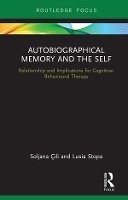Autobiographical memory shapes our understanding of ourselves, guides our behaviour, and helps us to develop and maintain relationships with others. The ways in which we interpret and narrate our memories have important implications for our psychological well-being, and can sometimes contribute to the onset and maintenance of a variety of psychological disorders.
Autobiographical Memory and the Self: Relationship and Implications for Cognitive-Behavioural Therapy synthesises the growing cognitive, social, personality, and clinical psychological literature on the memory-self relationship. It creates an interdisciplinary dialogue which explores autobiographical memory and its relevance for clinical practice, especially cognitive-behavioural therapy (CBT).
The authors propose a model for understanding the mechanisms of change involved in therapeutic interventions targeting negative or traumatic memories whilst providing insights into recent debates and avenues for future research. Autobiographical Memory and the Self will be useful to clinicians and clinical trainees, researchers, and psychology postgraduate students.

